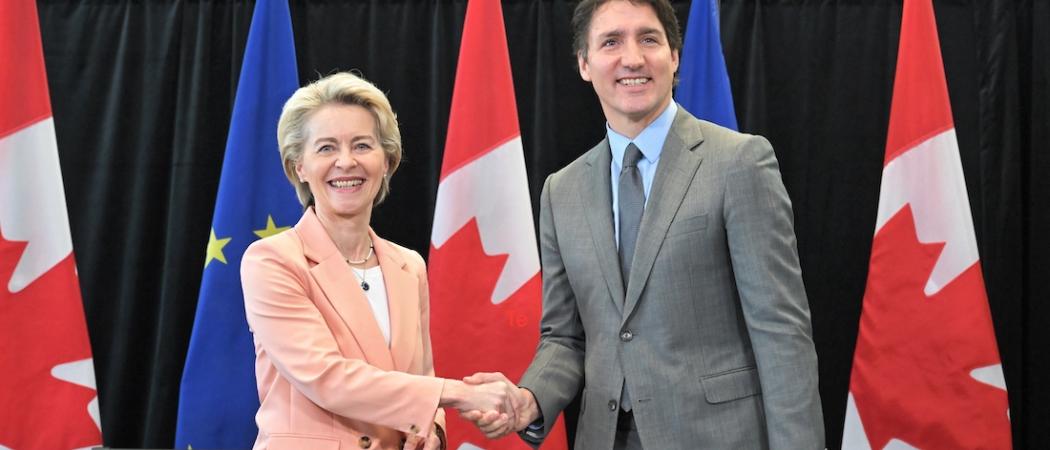The official announcement will be made later today, along with a flurry of other cooperation deals in climate, artificial intelligence and misinformation

Ursula von der Leyen and Justin Trudeau shaking hands after a bilateral meeting in March. Photo: European Commission
Canada is to join Horizon Europe, the EU’s €95.5 billion programme for research and innovation, according to Canadian prime minister Justin Trudeau.
“Canada's joining Horizon Europe, which is the greatest research and innovation mechanism in the world right now,” Trudeau said during a televised statement ahead of the Canada-EU summit taking place today, ending months of speculation over the success of negotiations between Ottawa and Brussels on association.
EU commission president Ursula von der Leyen and EU council president Charles Michel are in Newfoundland today to announce, together with Trudeau, “five big steps” towards closer collaboration in research and innovation, climate change and digital technologies.
“This is about some of the best of friends in the world, rolling up our sleeves and working together to build a better future,” Trudeau said.
Horizon association is the first on the list of five “concrete things” that EU and Canadian leaders will be announcing after the bilateral summit today.
The two sides will also work on the details of a digital partnership on artificial intelligence and resilient international connectivity infrastructure.
The EU will also join Canada's global carbon pricing challenge that Trudeau launched at COP26. Canada will also manufacture specialist firefighting planes or “water bombers” for the EU market, to deal with the growing number of wildfires caused by extreme heat, Trudeau said.
The Commission is expected to make an official statement this afternoon.
In Horizon 2020, the previous EU research programme, Canada ranked 3rd among non-associated third countries, after the US and China, winning 391 grants. According to the European External Action Service, the EU’s foreign policy arm, the EU-Canada summit will look at “steps to be taken to expand Canada’s participation under Horizon Europe.”
As early as March this year, EU officials were expressing optimism about being able to reach a deal with Canada. The Commission’s chief Horizon negotiator Signe Ratso said at the time that formal negotiations would be concluded by the end of 2023, so that Canadian researchers can access the EU programme from January 2024. That timeline was questioned by Canadian research stakeholders, who were worried budgetary concerns would delay a decision.
The association dilemma
The announcement Canada is joining Horizon Europe comes shortly after the EU commissioner for research and innovation Iliana Ivanova said she has made it her “personal priority” to bolster international research cooperation and “step up work” on Horizon Europe association deals with countries from around the world.
In the face of shifting geopolitics, the association strategy for Horizon Europe was downgraded from the optimistic promise of “open to the world” to “as open as possible, as closed as necessary,” a more reserved motto that addresses the growing chorus of politicians who are worried about sharing sensitive technologies.
Because of the war in Ukraine and the subsequent sanctions on Russia, but also to please the US and avoid technology leakage to China, the EU had to be more careful in choosing its international partners. While Commission officials agree that protectionism can stifle innovation, they are also wary of venturing into collaborative deals with countries they don’t trust.
Overall, getting association deals done took longer than many in Brussels expected, but the Canadian announcement is the latest in a string of positive news. The EU reached an agreement with the UK in September after years of political wrangling over post-Brexit trade and Northern Ireland’s status in the EU single market. More recently, Commission officials have announced they can finally start exploratory talks with Switzerland.





 A unique international forum for public research organisations and companies to connect their external engagement with strategic interests around their R&D system.
A unique international forum for public research organisations and companies to connect their external engagement with strategic interests around their R&D system.